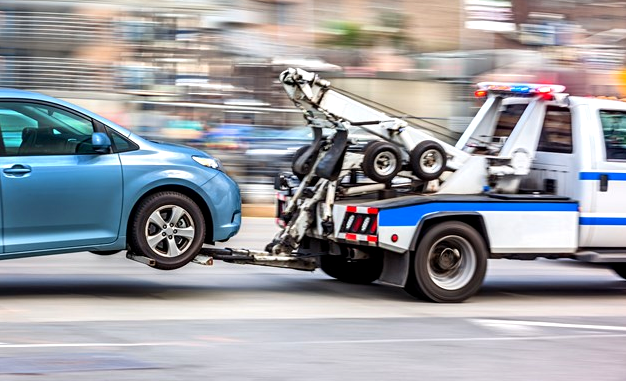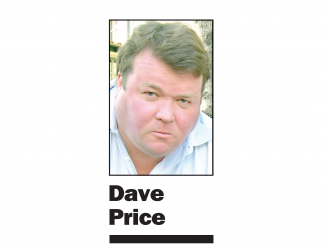
BY ELAINE GOODMAN
Daily Post Correspondent
A number of California cities, including Redwood City, are protesting a bill in the state Legislature that would prohibit the towing of cars with five or more unpaid parking tickets and make cities wait longer to tow vehicles that haven’t been moved in three days.
Assembly Bill 516, by Assembly members David Chiu, D-San Francisco, and Miguel Santiago, D-Los Angeles, is intended to protect low-income residents from the impacts of having their cars towed.
But the city of Redwood City, as well as the League of California Cities, oppose the bill, saying it would reward people who don’t pay their parking tickets.
Eliminating the threat of towing for unpaid parking tickets “will exacerbate parking scarcity by creating an environment vulnerable for exploitation,” Redwood City Mayor Ian Bain said in a letter to state lawmakers. Redwood City’s City Council last week approved sending the letter to Sen. Jerry Hill and Assembly member Kevin Mullin, whose districts include Redwood City.
No boots
In addition to the ban on towing cars with five or more unpaid parking tickets, AB516 also wouldn’t allow cars with unpaid tickets to be immobilized with a “boot.”
And in cases where towing is allowed, impounded cars could no longer be sold to cover towing and storage costs.
Another provision of AB516 is that cars parked in one place for more than 72 hours in violation of city code could no longer be towed immediately. Rather, a notice would have to be placed on the car for 10 business days, stating the deadline for moving the vehicle. If the car were still there after the 10 days, it could then be towed.
More vehicles left on the road over 72 hours
Bain, the Redwood City mayor, said in his letter that reports of vehicles left on the road for more than 72 hours have increased 10-fold over the past decade, to more than 5,000 complaints per year in 2017 — reflecting the severe parking crunch in neighborhoods.
Enforcement of the 72-hour parking limit is typically prompted by a complaint from a business or resident, he said.
“Compliance costs nothing and can simply involve moving a vehicle to a more acceptable location to avoid a tow,” Bain wrote.
The Western Center on Law & Poverty is a sponsor of AB516, and much of the bill’s rationale comes from a report by WCLP and other groups titled “Towed Into Debt.”
More than three-quarters of California residents need a car to get to work or use the car as part of their job, according to the text of AB516.
“For many Californians, their vehicle is their only shelter, their only way to get needed medical care or their most valuable asset,” the legislation states. “There is no public safety purpose when a local government uses towing as a costly and draconian method to collect small amounts of debt, and this sanction has a disproportionate impact on lower income families and people of color.”
AB516 has been amended since its introduction. A previous version called for a ban on towing vehicles parked in one place for more than 72 hours; that was changed to the proposed requirement for a 10-day notice before a car is towed.
An earlier version of AB516 also would have prohibited towing a car with registration that has been expired for six months or more. A new version of the bill keeps current law in place, allowing cars to be towed for expired registration.
Enforcement of parking rules is challenging
Despite the amendments, the League of California Cities is still opposed to AB516.
“Residential neighborhoods and major business corridors already struggle with limited parking spaces and will continue to struggle as communities densify, making parking enforcement much more essential,” the League said in a letter to lawmakers.
The League also noted that payment plans are offered to low-income people with unpaid parking tickets, with payments as low as $5 a month. A car is towed only if the payment plan has been ignored, the League said.
The Assembly passed AB516 on May 13 on a 49-11 vote. Mullin, who represents Redwood City, was one of 20 Assembly members who did not vote on it.
In the Senate, the Transportation Committee voted 9-2 on Tuesday to approve the bill. The Senate Public Safety Committee is scheduled to consider the bill on July 9.




What a great law! Support it totally. The idea that city governments on the Peninsula or tow companies are in more vulnerable positions than poor people targeted for towing is literally laughable.
Simple solution to this… stop breaking the law. How hard is it to be a responsible adult? Not supposed to park there? Don’t park there! If you decide to park there anyway, you should be punished. Low income does not put you above the law and people who think so are just bad people.
Dude…. Not having an extra $900.00 because your rent has quadrupled in past 4-5 years should not be considered a crime… Registration and parking tickets are not paid because THEY DON’T HAVE THE MONEY… it shouldn’t be a crime… And once your vehicle is gone …. There is no reliable efficient affordable public transportation in bay area…god this is about to get really bad
If you can’t afford to pay to register your vehicle or legally park it…then maybe it’s time to consider selling the vehicle and/or consider relocating to a more affordable location.
Follow the laws or pay the fines. Simple stuff, really.
Am I the only one kind of shocked by the harshness of some commenters here? “move to a more affordable area?”. All the ethical and empathy-deficiency issues aside, we should remember that when low, medium, and high income people can’t all live in metropolitan areas, we all suffer from more traffic, longer commutes, and a host of other social ills. NO ONE thinks “having low income puts you above the law,” that’s a ridiculous straw man argument. This is about ceasing to criminalize poverty in ways that degrade all and benefit none.
The idea that enforcing the law equally is “criminalizing poverty” is a funny way of excusing illegal behavior. If I refuse to pay the bill for my lunch because I can’t afford it, it’s still theft; it’s not “criminalizing poverty.” It’s called illegal behavior and, thankfully, we live in a society where we still enforce some laws (though just not open-air drug dealing, heroin injection, using sidewalks as toilets, blocking traffic, etc.)
Numerous people who live in NYC don’t have vehicles. I know a few who do, but have chosen to (pay a fee) to garage them in neighboring boroughs…because it is unaffordable for them to garage them in NYC. They are unable or unwilling to pay the monthly parking costs in NYC, and street parking means it will be towed and/or booted quickly. These people made decisions to work within the parameters of the law, as well as their financial means, to find a solution that allowed them to keep their vehicle and not need to worry about being ticketed, booted, or towed. A few opted to sell their vehicles entirely, saying it wasn’t worth the hassle. Not one of them expected the government to step in and grant them relaxed parking restrictions simply to make their lives easier, re: a decision on their vehicle, or cause them less of a financial burden.
@Butterfly Effect, thank you for sharing your views on this. Your perspective certainly presents a persuasive argument for enacting civil penalties on a sliding scale determined by either income or individual wealth. Thank you.
Butterfly Effect, I would further note that almost no one needs to drive in NYC because they have extant and functional public transit infrastructure (compared to ours, low bar here) and have also taken the step of making metro cards a flat rate through the boroughs. I respectfully recommend that you go to 511.org and take a look at what your commute looks like, in time and in money, by public transit here in the Bay Area. I would further observe that some people driving when they can’t truly afford to must do so in order to pick up their children after work, likely after a lengthy commute out of this incredibly wealthy enclave to places where there is more housing they can pay for. We need these workers here doing this work and can’t give them magic carpets to get around, this seems like a commonsense measure to benefit all.
I sort of agree with the new law but: 10 business days us too ling. – 5 is better. Tow companies should not be allowed to sell cars until after a very extended period -like 6 months. Unregistered cars should follow the same criteria, not a different set. Recall that roads are public and to use them or park on them requires payment (in the form of registration). It’s unfortunate that some have to live in their cars etc, but that is a separate issue. It’s not harsh to separate those discussions.
My commute from Stanford to SoMa (in SF) takes 47 minutes by car and costs gas for those 31 miles. My morning commute by public transit is at a minimum 2 hours 7 minutes and costs $11.25. that’s one way. I am a parent of a young child and I have a disability that makes the transit option very physically painful. If my car were to be towed and I could not afford to get it back, I would be paying $100 a week in transit and I would be unable to pick up my daughter on time, causing more financial penalties. I am privileged to have the money to get my car out if it’s towed, but if I didn’t, it is obvious that my car being taken could send my family in a rapid downward plummet financially. This is not about demanding convenience to me, or excusing criminal and antisocial conduct. I am the kind of rule follower that would die in the desert if I were driving through the boondocks and came to a broken traffic light stuck on red. It’s about recognizing that a car is more than a car to my family right now. It’s a means to survive and work and earn for my future.
David Chiu you’re an idiot!!! You realize this bill will affect poor and hard working families as well. Folks who live in heavily dense small streets will be overcrowded. Poor and middle class neighborhoods will have to fight for parking and suffer because someone can’t afford to pay her bill. Maybe take a bus or ride a bicycle, isn’t that a better choice??? The state already passed a law permitting folks to easily turn their garages into habitable spaces and does not require residents to provide sufficient parking in their lot. And you guys realize the rich and Mr. Chiu probably live in a wonderful quiet neighborhood and have no problem trying to find parking after getting off work late!! Wake up!!! Mind you, the article also states there are payment plans avail for low income as low as 5$ a month to pay for ur fines. Smh!!